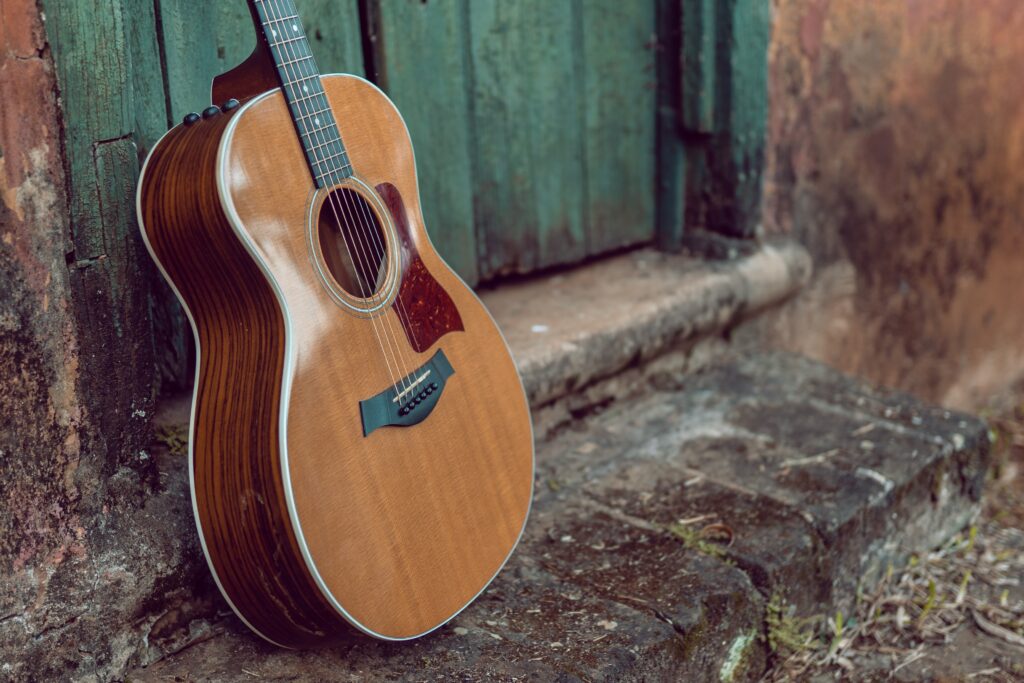
Are you a music enthusiast who can’t bear to part with your guitar even while on the go? Travel guitars are the perfect solution for musicians who want to continue strumming their tunes no matter where their journey takes them. Whether you’re embarking on a cross-country road trip, hopping on a plane for a globetrotting adventure, or just seeking a convenient practice companion, travel guitars have got you covered. In this comprehensive guide, we’ll explore everything you need to know about travel guitars, from acoustic to electric options, the ideal cases to carry them in, and even the necessary amplification. Let’s dive in and find your ideal travel guitar companion!
Table of Contents
- Introduction to Travel Guitars
- Why Travel Guitars Matter for Musicians on the Move
- Types of Travel Guitars
- Exploring Acoustic Travel Guitars
- Unleashing the Potential of Electric Travel Guitars
- The Allure of Headless and Foldable Guitars
- Innovative Marvel: The Martin Backpacker
- Choosing the Perfect Travel Guitar
- Considering Portability and Size
- Tonewood Selection for Optimal Sound
- Playability and Comfort on the Road
- Protecting Your Musical Companion
- Importance of a Reliable Travel Guitar Case
- Features to Look for in a Quality Case
- Amplification on the Go
- Exploring Travel-Friendly Guitar Amps
- Getting the Best Sound from Your Travel Electric Guitar
- Travel Guitar Accessories You Can’t Miss
- Must-Have Accessories for Maintenance and Playability
- Straps, Picks, and More: Enhancing Your Playing Experience
- Taking Your Travel Guitar on Adventures
- Creating Music Memories Anywhere and Everywhere
- Benefits of Expressing Yourself Through Travel Music
- Comparing Acoustic and Electric Travel Guitars
- Advantages and Drawbacks of Each Type
- Finding Your Perfect Match
- Top Brands and Models in the Travel Guitar Arena
- Reading Reviews and Seeking Recommendations
- Conclusion: Strumming Your Way Around the World
Introduction to Travel Guitars
For musicians with a passion for exploring new horizons, a travel guitar becomes more than an instrument – it’s a faithful companion that ensures your melodies never fade away. Whether you’re a strummer or a shredder, the need for music knows no bounds. Travel guitars, specifically designed with portability in mind, offer a harmonious blend of compactness and playability.
When life takes you places, your travel guitar remains a constant source of inspiration. Picture yourself strumming away on a quiet beach, a bustling city square, or under a starlit sky by a campfire. This guide is here to help you navigate the world of travel guitars, making sure you choose the right one for your musical expeditions.
Types of Travel Guitars
Exploring Acoustic Travel Guitars
When acoustic melodies beckon amidst your travels, an acoustic travel guitar answers the call. Crafted with quality tonewoods, these guitars produce mellifluous tunes that capture the essence of every journey. From the soulful tunes by the campfire to serenading a sunset on a distant shore, acoustic travel guitars ensure that music remains your constant companion.
The design of acoustic travel guitars focuses on delivering excellent sound projection and resonance in a compact package. Some models even feature innovative body shapes to balance portability and tone quality. If you’re a fan of folk, country, or unplugged music, an acoustic travel guitar can be your perfect sidekick.

Unleashing the Potential of Electric Travel Guitars
But what if rock ‘n’ roll runs through your veins? Electric travel guitars are here to turn up the volume on your adventures. These guitars pack a punch, delivering signature electric guitar sound in a compact package. Unleash your inner rockstar while on the go, from searing solos to catchy riffs, and watch as your audience forms wherever you set foot.
Electric travel guitars often come with built-in pickups and electronics, allowing you to plug into amplifiers or even headphones for private jam sessions. The sleek and ergonomic design of these guitars ensures you’re ready to shred at a moment’s notice, whether you’re jamming in your hotel room or performing on a street corner.
The Allure of Headless and Foldable Guitars
In the world of innovation, headless and foldable guitars stand as symbols of progressive design. With a headless guitar, weight distribution becomes optimal, reducing strain during extended playing sessions. Foldable guitars, on the other hand, redefine portability – they can easily fit into your backpack, allowing you to strum a tune whenever inspiration strikes, no matter how far off the beaten path you are.
These guitars are a testament to the marriage of technology and music. They are engineered for convenience without compromising playability and sound quality. If you’re a modern-day troubadour, these innovative guitar designs might be your ideal companions.
Innovative Marvel: The Martin Backpacker
Among these innovations, the Martin Backpacker holds a special place. Crafted by the renowned guitar manufacturer Martin, this compact guitar is built for the explorer. Its unique shape and size make it an exceptional companion for treks, hikes, and spontaneous musical interludes in the great outdoors.
The Martin Backpacker’s distinct body design allows it to fit snugly in its padded carrying case, which also resembles a backpack – hence the name. This guitar is the embodiment of convenience and durability, ensuring that you can venture into the wild with your music always by your side.
Choosing the Perfect Travel Guitar
Considering Portability and Size
One of the primary factors that set travel guitars apart is their portability. These guitars are designed to be easily carried on your journey, whether you’re backpacking through Europe or embarking on a road trip across the country. The compact size of travel guitars ensures they can fit in overhead compartments, car trunks, or even strapped to your backpack.
When selecting a travel guitar, think about your travel style and destinations. If you’re a frequent flyer, you’ll want a guitar that meets airline regulations for carry-on items. If you’re an adventurer who enjoys hiking to remote locations, a foldable or compact guitar might be your best bet.
Tonewood Selection for Optimal Sound
Despite their smaller size, travel guitars can still produce impressive sound quality, thanks in part to the careful selection of tonewoods. Tonewoods play a crucial role in shaping the guitar’s sound characteristics, and travel guitars are no exception.
Common tonewoods used in travel guitars include mahogany, spruce, and cedar. Mahogany is known for its warm and balanced tone, making it a popular choice for both acoustic and electric travel guitars. Spruce offers bright and articulate tones, while cedar provides a warm and rich sound.

Playability and Comfort on the Road
Traveling often involves long hours of waiting and transit. A comfortable and playable travel guitar can make those hours more enjoyable. Look for guitars with ergonomic designs, smooth fretboards, and well-balanced weight distribution. Some travel guitars come with specialized neck shapes that enhance playability, allowing you to practice and perform for extended periods without discomfort.
When trying out a travel guitar, consider how it feels in your hands and against your body. The more comfortable and natural it feels to play, the more likely you are to stay inspired and continue honing your skills while on the road.
Protecting Your Musical Companion
Importance of a Reliable Travel Guitar Case
Your travel guitar is more than just an instrument – it’s a cherished possession that deserves protection. A high-quality travel guitar case is essential to shield your instrument from the rigors of travel. Whether it’s being loaded onto planes, stowed in cars, or carried on your back, a sturdy case ensures your guitar remains safe and sound.
Hardshell cases offer maximum protection, shielding your guitar from impacts, temperature changes, and humidity. Soft gig bags are more lightweight and convenient for short trips, providing basic protection while allowing for easy transportation. Some travel guitars even come with specially designed cases that enhance their portability.
Features to Look for in a Quality Case
When shopping for a travel guitar case, consider the following features:
- Padding and Lining: Look for cases with ample padding and a soft lining to cushion your guitar and prevent scratches.
- Water Resistance: A water-resistant or waterproof case helps protect your guitar from rain, spills, and humidity.
- Storage Space: Extra compartments in the case can hold accessories like picks, strings, and tuners, keeping everything you need in one place.
- Locks and Latches: Secure locks and latches ensure that your case stays closed during transit, preventing accidental openings.
- Backpack Straps: Some cases come with backpack-style straps, making it easier to carry your guitar hands-free.
Investing in a quality case not only safeguards your guitar but also extends its lifespan, allowing you to create music memories for years to come.
Amplification on the Go
Exploring Travel-Friendly Guitar Amps
If you’re an electric guitar enthusiast, amplification is a crucial aspect of your sound. Travel-friendly guitar amps cater to your need for volume and tone shaping while on the move. These amps are compact, lightweight, and often battery-powered, making them perfect companions for busking, impromptu performances, or even late-night practice sessions in hotel rooms.
Battery-powered amps are especially useful when you’re away from power sources, ensuring you can continue playing regardless of your location. Some models also offer built-in effects like reverb, delay, and distortion, allowing you to experiment with your sound without needing an extensive pedalboard setup.
Getting the Best Sound from Your Travel Electric Guitar
To get the best sound out of your travel electric guitar, consider the following tips:
- Tweak the Settings: Spend time experimenting with the amp’s settings to find the perfect tone for your playing style.
- Use Headphones: If you’re in a shared space or practicing late at night, plug in your headphones to enjoy your playing without disturbing others.
- Positioning Matters: The acoustics of your environment can affect the sound of your amp. Try different locations and angles to find the optimal setup.
- Keep Your Guitar in Tune: A well-tuned guitar ensures that your sound remains crisp and in harmony, even on a compact amp.
With the right travel-friendly amp, you can capture the essence of your electric guitar’s sound while on the go, making every performance a memorable one.
Travel Guitar Accessories You Can’t Miss
Must-Have Accessories for Maintenance and Playability
When you’re far from home, it’s essential to have a toolkit of accessories that keep your travel guitar in top shape. Here are some accessories you shouldn’t leave behind:
- Guitar Tuner: A compact tuner ensures your guitar is always in tune, enhancing the quality of your sound.
- String Winder and Cutter: Changing strings is a breeze with a string winder, and a cutter helps you trim excess string length neatly.
- Polishing Cloth: Keep your guitar clean and free from fingerprints with a microfiber polishing cloth.
- Hygrometer: For acoustic guitars, a hygrometer helps monitor humidity levels to prevent damage to the wood.
- Spare Strings: Pack an extra set of strings in case you need to replace a broken or worn-out string.
Straps, Picks, and More: Enhancing Your Playing Experience
Comfort is key when playing a travel guitar, and the right accessories can make a world of difference:
- Guitar Strap: A comfortable strap allows you to play standing up without straining your shoulders.
- Picks: Carry a variety of picks with different thicknesses to adapt to different playing styles and genres.
- Capo: A capo lets you change the key of your songs on the fly, adding versatility to your repertoire.
- Slide: If you’re into slide guitar playing, a compact slide can open up new sonic possibilities.
- Compact Stand: A collapsible guitar stand provides a safe and stable spot for your guitar when you’re not playing.
Having the right accessories on hand ensures that your travel guitar journey remains hassle-free and enjoyable.

Taking Your Travel Guitar on Adventures
Creating Music Memories Anywhere and Everywhere
With your travel guitar by your side, you have the power to create music memories in the most unexpected places. Imagine strumming along to a gentle breeze on a mountain peak or serenading locals at a bustling market square. Music is a universal language that transcends cultural barriers, allowing you to connect with people from all walks of life.
Beyond the melodies, your travel guitar serves as a conversation starter, a way to make friends, and a means of expressing your emotions when words fall short. Every chord you play becomes a soundtrack to your journey, a reminder of the places you’ve been and the people you’ve met.
Benefits of Expressing Yourself Through Travel Music
Playing music while traveling offers numerous benefits beyond just entertainment:
- Stress Relief: Music is known to reduce stress and anxiety, providing a soothing escape during long travels or unfamiliar situations.
- Cultural Exchange: Sharing your music with locals can lead to cultural exchange and unique insights into the places you visit.
- Personal Growth: Overcoming stage fright or performing in new environments contributes to personal growth and confidence.
- Memorable Moments: The memories of playing your guitar at iconic landmarks or intimate gatherings will stay with you forever.
Whether you’re playing for an audience or just for yourself, your travel guitar enriches your journey with melody and meaning.
Comparing Acoustic and Electric Travel Guitars
Advantages and Drawbacks of Each Type
Both acoustic and electric travel guitars have their own strengths and considerations. Acoustic guitars offer a pure and natural sound, perfect for intimate settings and outdoor performances. They require no external amplification and can be played anywhere, making them versatile companions for travelers seeking an organic sound.
On the other hand, electric travel guitars open up a world of sonic possibilities through amplification and effects. They are well-suited for genres that demand a wider tonal range and experimental sounds. However, they do require access to power sources for amplification, which might be a consideration for some travel situations.
When choosing between acoustic and electric travel guitars, consider your preferred playing style, musical genre, and the kind of environments you’ll be performing in. Some musicians even opt for both, ensuring they’re equipped for any musical situation.
Finding Your Perfect Match
Top Brands and Models in the Travel Guitar Arena
As you embark on your journey to find the ideal travel guitar, exploring reputable brands and models is a great starting point. Brands like Martin, Taylor, Yamaha, and Traveler Guitar offer a range of options designed specifically for travel. Each brand has its unique design philosophy and tonal characteristics, allowing you to find a guitar that resonates with your musical preferences.
In addition to brand reputation, reading reviews and seeking recommendations from fellow musicians can provide valuable insights. Online forums, music stores, and social media platforms can connect you with experienced travel guitarists who can share their experiences and advice.
Conclusion: Strumming Your Way Around the World
Your travel guitar isn’t just an instrument – it’s a vessel of melody and emotion that accompanies you on your journey. Whether you’re creating music memories in a bustling city, finding solace in nature’s serenity, or sharing your tunes with fellow travelers, your guitar becomes an extension of your soul.
By now, you’ve explored the world of travel guitars, from the resonant tones of acoustic companions to the electric energy of rock-ready axes. You’ve learned how to choose the perfect guitar, protect it on your adventures, amplify your sound, and enhance your playing experience with accessories. Armed with this knowledge, you’re ready to embark on a musical journey that knows no bounds.
So, pack your bags, tune your strings, and let your travel guitar be the soundtrack to your explorations. Strum, pluck, and play – the world is your stage, and your travel guitar is your faithful partner in harmony.
FAQs About Travel Guitars
1. Can I carry my travel guitar on an airplane? Absolutely! Most travel guitars are designed to meet airline regulations for carry-on items. However, it’s a good idea to check with the airline before you travel to ensure that your guitar meets their specific guidelines.
2. Are travel guitars suitable for beginners? Yes, travel guitars can be great options for beginners. They are often more compact and easier to handle, making them comfortable for players of all skill levels. Just make sure to choose a model that suits your playing style and preferences.
3. Can I use regular guitar strings on a travel guitar? Yes, you can use regular guitar strings on a travel guitar. However, some travel guitars have shorter scales, so it’s a good idea to choose strings that match the scale length of your guitar for optimal playability and tone.
4. Are travel electric guitars as versatile as full-sized electric guitars? While travel electric guitars offer a high level of versatility, they might have some limitations compared to full-sized electric guitars, particularly in terms of tonal complexity and sustain. However, advancements in technology have led to travel electric guitars that can produce impressive tones and effects.
5. How do I maintain my travel guitar while on the road? Maintaining your travel guitar while traveling is important to ensure its longevity. Keep it in a protective case when not in use, wipe it down regularly to remove dirt and sweat, and change strings if they become worn. Also, keep an eye on the humidity level, especially for acoustic guitars, to prevent any damage to the wood.
Remember, your travel guitar is more than just an instrument – it’s a companion that enriches your journey with melody, creativity, and connection.

